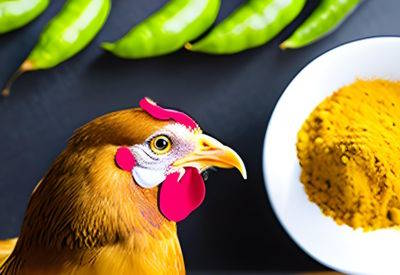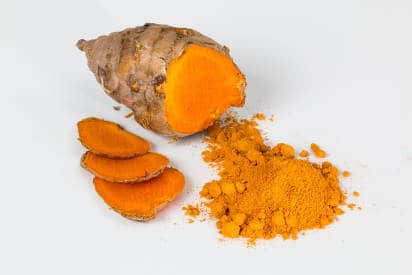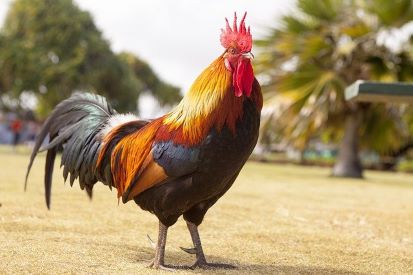Have you ever been chatting with fellow chicken owners and wondered what you could do to boost the health and well-being of your feathery friends? I know I have. I recently stumbled upon an interesting tidbit about the benefits of a spice we often use in our meals: turmeric. It got me thinking, can chickens eat turmeric?
The answer, as it turns out, is a resounding yes! Chickens can indeed eat turmeric, and it’s not just a tasty treat for them; it can also provide some fantastic health benefits. I couldn’t wait to share this information with you and other chicken owners who might be looking for ways to improve their flock’s health.
In this article, we’ll dive into the world of turmeric and chickens, exploring the benefits of this powerful spice for your birds, the potential concerns you should be aware of, and how to safely introduce it into their diet. Whether you’re raising chickens in your backyard or managing a larger farm, you’ll find that adding turmeric to their diet can be a game-changer.

Can chickens eat turmeric?
They sure can! Turmeric is not only safe for chickens, but it can also provide some health benefits for our feathery friends. Just be sure to offer it in moderation, as too much of anything can be harmful.
[ChickenAffiliate]
The benefits of eating turmeric for chickens
Now, you might wonder what kind of benefits turmeric can provide your chickens. Do you know how we always hear about the exceptional health properties of turmeric for us humans? Well, it turns out that some of those benefits also apply to chickens!
Anti-inflammatory properties
Turmeric contains a compound called curcumin, which has potent anti-inflammatory effects. This can help reduce swelling and inflammation in your chickens, particularly if they suffer from injuries or infections.
Antioxidant boost
Turmeric is packed with antioxidants, which can help protect your chickens’ cells from damage. This can lead to better overall health and may even help prevent certain diseases in your flock.
Enhanced immunity
The antioxidant and anti-inflammatory properties of turmeric can also boost your chickens’ immune systems, helping them fight off illness more effectively.
Liver support
Turmeric can help improve liver function in chickens, which is essential for breaking down toxins and maintaining overall health.
Things to watch out for when feeding turmeric to chickens

While turmeric can be a fantastic addition to your chickens’ diet, there are a few things you should be mindful of when introducing it.
Staining
Turmeric’s bright yellow color can stain almost anything it touches – including your chickens’ feathers. If you’re worried about your chickens turning yellow, you might want to avoid feeding them large amounts of turmeric.
Potential for digestive upset
Like any new food, turmeric can potentially cause digestive issues if introduced too quickly or in large amounts. Start with small amounts and monitor your chickens for signs of digestive upset.
Turmeric quality
Make sure you’re feeding your chickens high-quality, pure turmeric. Some products may contain additives, fillers, or contaminants that could harm your birds.
How often should chickens eat turmeric?
Now that we know turmeric can be a beneficial addition to your chickens’ diet, how often should you give it to them? The general rule of thumb is to offer turmeric as an occasional treat or supplement – not a daily staple.
A good guideline is to add turmeric to their diet once or twice a week. This way, they’ll get the benefits without the risk of overdoing it.
How to prepare turmeric for feeding to chickens

There are several ways you can introduce turmeric to your chickens’ diet. Here are a few easy methods.
Turmeric powder
The simplest way to feed turmeric to your chickens is by using a high-quality turmeric powder. You can mix the powder into their regular feed or create a special treat by combining it with other healthy ingredients like yogurt or oats.
Fresh turmeric root
If you can access fresh turmeric root, you can grate or chop it into small pieces and mix it into your chickens’ feed. Remember that fresh turmeric root can be more potent than powdered turmeric, so start with small amounts and adjust as needed.
Turmeric-infused water
Another option is to create turmeric-infused water for your chickens to drink. Simply mix a teaspoon of turmeric powder with a gallon of water. This can be a great way to provide the benefits of turmeric without the risk of staining their feathers.
Can baby chicks eat turmeric?
Great question! When it comes to baby chicks, it’s best to err on the side of caution. While turmeric is generally safe for adult chickens, the digestive systems of baby chicks are still developing, and they might not be able to handle new foods as well as their older counterparts.
However, if you want to introduce turmeric to your baby chicks, you can try it in small amounts once they’re a few weeks old. Start with a tiny pinch of turmeric powder mixed into their feed and see how they react. You can gradually increase the amount over time if you don’t notice any adverse effects. Be extra careful not to overdo it, as baby chicks are more sensitive to new foods than adult chickens.
What other spices can chickens eat?

Turmeric isn’t the only spice that can benefit your chickens’ health. Several other spices can be safely fed to your flock and offer various perks. Let’s explore four additional spices your chickens can enjoy: ginger, dill, cinnamon, and fennel.
Ginger
Ginger is a popular spice known for its distinct flavor and numerous health benefits. It’s safe for chickens to consume and can provide fantastic advantages for your flock. Ginger is well-known for its anti-inflammatory properties, which can help reduce swelling and inflammation in your chickens.
Additionally, ginger has digestive benefits and can help soothe upset stomachs, making it an excellent addition to their diet if they experience digestive issues.
Read More: Can Chickens Eat Ginger? 5 Amazing Benefits
Dill
Dill is another spice that can be safely fed to your chickens. Rich in antioxidants and containing anti-inflammatory properties, dill can help protect your chickens’ cells from damage and promote overall health.
Dill also has a calming effect, making it particularly useful for chickens that may be stressed or anxious. Its fresh and aromatic flavor can be a delightful addition to their meals.
Read More: Can Chickens Eat Dill? 6 Awesome Benefits
Cinnamon
Cinnamon is a well-loved spice that can also be offered to your chickens. It has numerous benefits for their health, including its potent antioxidant and anti-inflammatory properties. Cinnamon has been shown to help regulate blood sugar levels and promote heart health, which can benefit your flock.
Additionally, cinnamon can help ward off harmful bacteria and fungi, making it an excellent addition to your chickens’ diet for maintaining a healthy environment.
Read More: Can Chickens Eat Cinnamon? 5 Excellent Benefits
Fennel
Fennel is another spice that can be safely fed to your chickens. It is rich in antioxidants and offers digestive benefits, helping to soothe stomach issues and promote regularity. Fennel has also been shown to have respiratory benefits, making it particularly useful for chickens experiencing respiratory issues. Its sweet and aromatic flavor can also be a refreshing treat for your birds.
Read More: Can Chickens Eat Fennel? 3 Important Benefits
Incorporating these spices into your chickens’ diet can provide various health benefits and add excitement to their meals. Just like with turmeric, always remember to introduce new spices gradually and in moderation to ensure the well-being of your flock. Happy chickens make for happy chicken owners!
Storing and handling spices for your chickens
To make the most of the health benefits spices can provide for your chickens, storing and handling them properly is essential. Here are some tips to help you maintain the freshness and potency of the spices you feed to your flock:
- Store spices in a cool, dark, and dry place: Exposure to heat, light, and moisture can reduce your spices’ potency and shelf life. Keep them in airtight containers and store them away from direct sunlight or heat sources.
- Use fresh spices: The older the spice, the less potent it becomes. Check the expiration date on your spices, and try to use them within their recommended shelf life. Opt for high-quality, fresh spices to ensure your chickens get the most benefits.
- Introduce spices gradually: When adding new spices to your chickens’ diet, start with small amounts and gradually increase the quantity as your chickens become accustomed to them. This can help prevent digestive issues and allow you to monitor their reaction to the new addition.
- Mix spices with other foods: Combine spices with other healthy ingredients, such as yogurt, oats, or their regular feed, to create a balanced and flavorful meal for your chickens. This can also help ensure they’re getting a well-rounded diet with a variety of nutrients.
Following these guidelines ensures that the spices you feed your chickens remain fresh, potent, and beneficial for their health. With the proper care and handling of these spices, your flock will enjoy their many perks.
Can chickens eat turmeric – final thoughts
So there you have it, my fellow chicken enthusiasts! We’ve discovered that chickens can eat turmeric, and this golden spice can provide many health benefits for our beloved birds.
From its anti-inflammatory properties to its immune-boosting power, turmeric can be an invaluable addition to your chickens’ diet. Remember to look for potential issues like staining and digestive upset, and always opt for high-quality turmeric.
Feeding your chickens turmeric might make you the most popular person in the coop! With a bit of creativity and a dash of this vibrant spice, you’ll be on your way to raising happier, healthier chickens. So why not give it a try? Introduce turmeric into your chickens’ lives, and you might find yourself with a flock clucking with gratitude.
